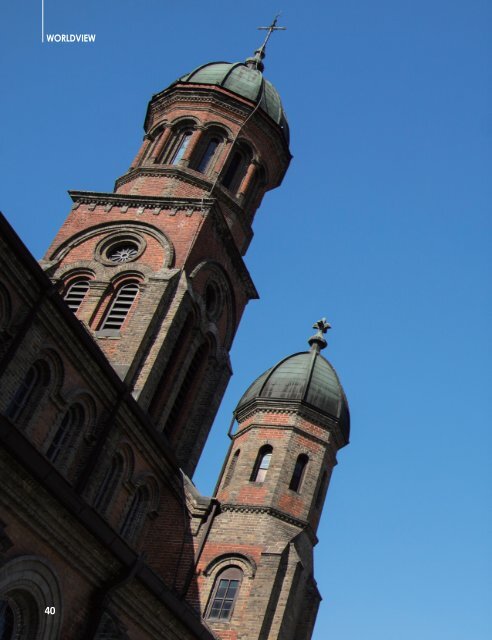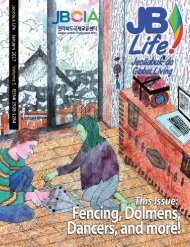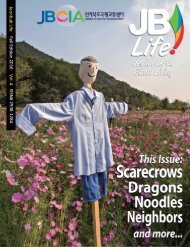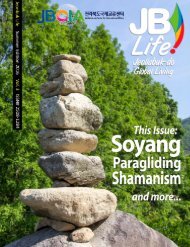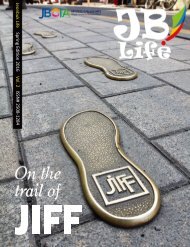JB Life March 2017
The Spring version of JB Life, North Jeolla's quarterly global lifestyle magazine.
The Spring version of JB Life, North Jeolla's quarterly global lifestyle magazine.
You also want an ePaper? Increase the reach of your titles
YUMPU automatically turns print PDFs into web optimized ePapers that Google loves.
WORLDVIEW<br />
40<br />
By DAVID VAN MINNEN<br />
<strong>JB</strong> <strong>Life</strong> Co-Editor<br />
NOTE: This article is part of a multi-issue series investigating<br />
the religious roots of North Jeolla and Korea<br />
throughout history until the present. It is the aim of this<br />
series to sketch out the way Jeolla natives think. This is<br />
for the purpose of greater understanding, multicultural<br />
sensitivity, and to tear down the walls of misunderstanding.<br />
Jeonbuk civilization has its own unique, complex<br />
blend of history and mindset. The picture in this series is<br />
admittedly painted with a broad brush; but it may be a<br />
helpful backdrop to your interactions and appreciation<br />
of our beautiful host culture.<br />
A<br />
worldview is a collection of presuppositions.<br />
These presuppositions are like lenses, and we<br />
see the world through them. Everybody has<br />
a worldview. Some are as simple as a pair of 3D movie<br />
glasses, and others are as complex as a kaleidoscope.<br />
Most of us go through life without really analyzing<br />
our worldviews and enjoy the show in Plato’s Cave all<br />
through life. Some of us spend a lot of time and money<br />
and studious effort to become ‘enlightened’ and say<br />
pithy things like, “The unexamined life is not worth living.”<br />
At the end of the day, we all inescapably have a<br />
worldview, and we all can benefit from careful reflection<br />
-- and from an outside perspective.<br />
If we are in a foreign culture, the more we understand<br />
our host’s worldview, the less we will be baffled, annoyed,<br />
and indignant when strange things happen. Such<br />
understanding can temper our frustrations into compassion,<br />
and our reactions into responses; and even respect.<br />
It can also trigger a critical examination of our own<br />
worldviews that we brought with us.<br />
In previous installments of this series, we began to survey,<br />
in chronological order, the mixture of contributing<br />
mindsets that compose Jeonbuk’s basic worldview. We<br />
started with Jeolla province’s manifestation of grassroots<br />
Animism and interviewed a local mudang. Next<br />
was a too-brief glimpse at the very dominant Confucianism,<br />
which is something hard to understand merely by<br />
reading about it. It’s like explaining saltwater to someone<br />
who’s only known a lake. To really get a grasp of the<br />
Confucian way, you have to come here, to Korea. Last<br />
issue’s article spoke of Buddhism’s influence, and featured<br />
Jeolla’s own contribution, Won Buddhism: practical<br />
Buddhism made simple and accessible to all.<br />
Now let’s turn our attention to the next major influence<br />
to land on Korean soil: Roman Catholicism.<br />
A quick Google search will show that “Catholic” is<br />
천주교 (cheon ju kyo) in Korean, stemming from the<br />
Chinese “heaven lord religion,” or a less wooden translation,<br />
“The religion of the Lord of Heaven.” Records<br />
show the first Catholic missionary here was a Portugese<br />
Jesuit who landed in Busan in 15-something, but then it<br />
gets pretty foggy. Mentions of early Korean Christians<br />
are scattered through histories, and many places claim<br />
to be the real birthplace of the faith on this peninsula,<br />
but it’s pretty much uncontested that the faith as a movement<br />
flourished here through 솓 instumentation and<br />
martyrdom of a Korean man named Yi Seung-hun.<br />
It was Koreans who embraced the faith, and who shared<br />
it here in Korea; not European missionaries. The faith<br />
was taught freely and simply, accessible to all classes,<br />
and to women, and to beggars, without prejudice.<br />
Yi Seung-hun was Yangban (nobility) born in Seoul in<br />
1756. He accompanied his father on a diplomatic mission<br />
to Beijing, where he converted to Catholic Christianity,<br />
entered the priesthood, and brought the<br />
g<br />
Jeonbuk <strong>Life</strong> 41


